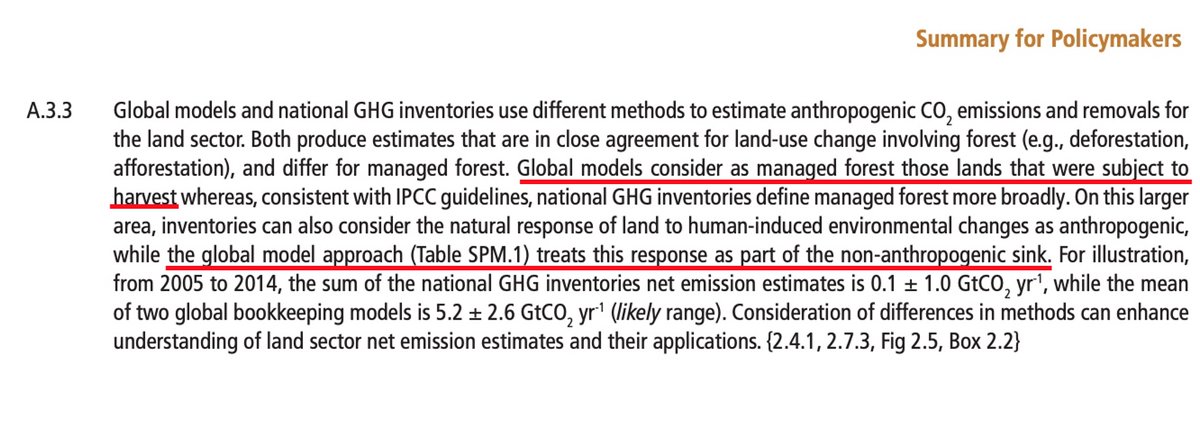
Managed #forest landscapes is how big part of the #climate solutions that we need?
Here's some background and some thoughts. /1
Here's some background and some thoughts. /1
Starting with the annual update of net sink in Swedish forests: A continued large net uptake by trees and soil (35 Mt CO2/yr)
This is the enduring effect of long-term investments in the forest-based sector. But what about the rest of the world? /2
slu.se/ew-nyheter/202…
This is the enduring effect of long-term investments in the forest-based sector. But what about the rest of the world? /2
slu.se/ew-nyheter/202…
At EU level the net forest sink is 400 Mt CO2/yr which corresponds to 10% of EU emissions. Forests are actively managed and #wood harvest is well below (2/3) of the growth.
But this is not the full story of climate solutions from EU managed forests. /3
eea.europa.eu/publications/e…
But this is not the full story of climate solutions from EU managed forests. /3
eea.europa.eu/publications/e…
EU forest products also displace 400 MtCO2/yr of #fossil emissions.
This is the amount of fossils that stays in the ground because we use renewable biomass instead. Paper- not plastics. Wood - not cement. Bioenergy - not coal. /4
euractiv.com/section/energy…
This is the amount of fossils that stays in the ground because we use renewable biomass instead. Paper- not plastics. Wood - not cement. Bioenergy - not coal. /4
euractiv.com/section/energy…
So the total positive effect of the EU forest-based sector is 0,8 GtCO2 or equal to 20% of EU fossil emissions. This is a lot.
And it could be much more if we invest in innovation and efficiency gains /5
And it could be much more if we invest in innovation and efficiency gains /5
Worldwide, wood use is about 8 times EU, almost all from managed forests delivering a net sink as well as products displacing fossils. So we seem to get c 5 Gt/yr help from #forestry in solving the climate problem. (Global emissions stand at 40 Gt/yr) /6
fao.org/faostat/en/#da…
fao.org/faostat/en/#da…
So why do we not hear more about #forestry as a big part of the #climate solution?
Especially since there is a huge potential to improve climate benefits from forests even more?
Essentially for four reasons. /7
Especially since there is a huge potential to improve climate benefits from forests even more?
Essentially for four reasons. /7
(1) When IPCC presents global models they don't count management of forests and they don't connect forest product performance to the forest.
Instead, tree removals become the entire forest story and forestry is stated to be "11% of the problem" /8
ipcc.ch/site/assets/up…
Instead, tree removals become the entire forest story and forestry is stated to be "11% of the problem" /8
ipcc.ch/site/assets/up…

(2) What we hear is #deforestation. True, this is a big deal and bad for the climate. But this is not managed forests.
It is almost entirely about agriculture encroaching into unmanaged forests. Should not be confused with managed forest landscapes /9
unfccc.int/news/un-climat…
It is almost entirely about agriculture encroaching into unmanaged forests. Should not be confused with managed forest landscapes /9
unfccc.int/news/un-climat…
(3) Concern of biodiversity loss leads to opposition to forestry with idea that wood harvesting leads to biodiversity loss. But forest management includes care for the natural environment. Legislation & control systems are in place. Concerns may be exaggerated. /10
(4) Climate solutions are only considered solutions if they are "additional". That is, they only count if a dedicated climate action was taken.
So a tree that is planted for climate mitigation first counts, but a tree planted for forestry doesn't. /11
ghginstitute.org/2012/01/25/how…
So a tree that is planted for climate mitigation first counts, but a tree planted for forestry doesn't. /11
ghginstitute.org/2012/01/25/how…
The "additionality" principle is a major obstacle. Demanding exclusivity of climate benefits doesn't go well with multi-purpose forestry activities. But this stronghold of climate policy is there to secure that climate funds are only used on climate. /12
openknowledge.worldbank.org/bitstream/hand…
openknowledge.worldbank.org/bitstream/hand…
Fair enough, so-called "co-benefits" are recognized. That is, it's ok if there are collateral benefits, eg to the local economy. But this is a one-way street.
Climate being a co-benefit of, say, forestry is not part of the climate policy discourse. /13
en.wikipedia.org/wiki/Co-benefi…
Climate being a co-benefit of, say, forestry is not part of the climate policy discourse. /13
en.wikipedia.org/wiki/Co-benefi…
The concept of getting climate benefits "for free" because investments and financial performance in the forest-based sector works well in its own right is not well accepted. It can even be seen as unfair competition that dumps the prices on a lucrative climate action market. /14
So here we are. A very big (and potentially much bigger) part of the solution (the forest-based sector) is largely sidelined by structures and policy discourse in climate politics.
Do we have time to wait for climate talks to change this? /15
Do we have time to wait for climate talks to change this? /15
• • •
Missing some Tweet in this thread? You can try to
force a refresh


